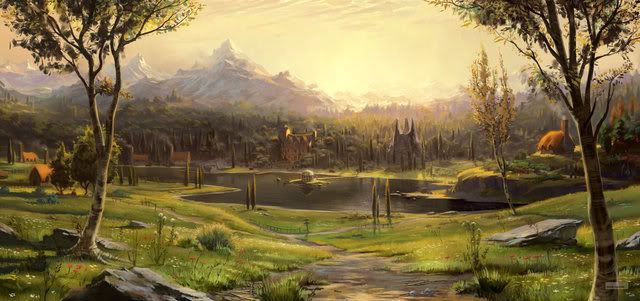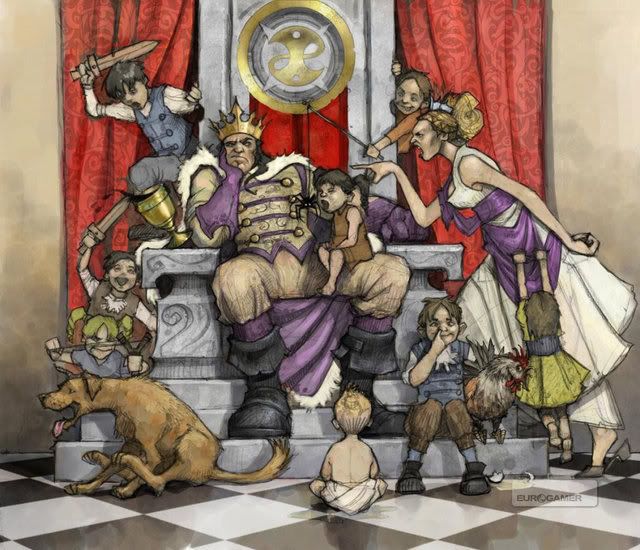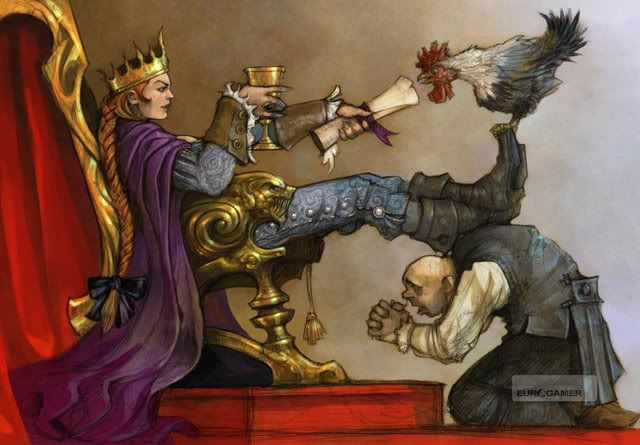The next installment of the Fable game series, which is said to be released sometime in 2010 (more than likely the holidays)

Fable III begins approximately five decades after the events of Fable II. The game will follow the story of the son or daughter of the Hero of Bowerstone as they help stage a rebellion against the ruler of Albion in their quest to become the new king or queen. Once the character has gained the crown of Albion, the second half of the game is spent ruling over and directing the future course of Albion.
Peter Molyneux revealed at Gamescom '09 that the gameplay of Fable III will be similar to that of previous installments in the series albeit with more options in the way the player is able to overcome challenges with which they are faced. The initial stage of the game following the player character and their rebellion against Albion, is stated to feature the ability to create alliances with different factions by making promises and commitments which the player will have to break or keep once they achieve control of Albion.

Once the protagonist becomes ruler of Albion they will still be capable of going out into the world and undertaking quests but they will also be able to delegate problems to their followers and pass 'judgement' over situations from afar, actions which will have varying degrees of impact upon the protagonist, their kingdom and its inhabitants. The player will be able to investigate each case brought to them before passing judgement if they choose or simply decide the outcome based on the information initially given to them though the player is still able to judge any way they choose despite any evidence.

Molyneux also debuted a system named 'touch' which replaces the 'expressions' system seen in previous installments. Touch allows the player to convey emotion and interact with other characters in the world through physical acts such as hand-shaking, hugging or kissing. 'Dynamic touch' allows the player to interact with other characters in a variety of events such as comforting a crying child or reassuring an ally with a tap on the back. The full extent of this ability has not yet been detailed.
New (as of October 14, 2009)
Players can migrate their savegames from Fable II to Fable III. This allows the player's actions from Fable II to impact on the world of Fable III as their parent in the third game is their Hero from the second game.
Molyneux explained a new mechanic called "judgements," started when the player grants their subjects an audience to hear their problems. Often these problems will be disputes with "muddied moral waters." If the player is impatient, they can make a quick decision to lock one party of the dispute in their dungeons, do nothing or reward one party with gold. If the player wants to becomes more informed, they can choose to journey to the scene of the crime itself and make a just (or purposefully unjust) decision on the matter. In addition to this, players have to make decisions about what promises they made in the early stages of the game they need to keep and give their full attention and what promises should be ignored. Molyneux's intention is to show that the great revolutionary heroes that have become mythologized aren't necessarily good rulers themselves. He asks, "If someone comes to you and begs for mercy, are you going to be the sort of tyrant who picks them up and throws them in the dungeon? Or are you going to be the sort who grabs them by the shoulders and gives them a big hug and shoves ten gold pieces in their hand?"
There are rewards for being a self-serving ruler, including a treasury filled with gold piles that grow or diminish based on the player's wealth. The player's in-game family will attempt to pressure the player into selfishly taking money from Albion to maintain and upgrade their castle.
The player is also tasked with dealing with how their society works on a day-to-day basis, such as how to handle crime, poverty and taxation. Another example is the choice to go to war. While Albion is only a single continent in a much-larger world, Fable III is the first game in the series to expand the playable areas beyond Albion's borders.
Like the character-morphing that defines the series, where the player's character changes appearance based on his or her actions, growing beautiful or ugly based on good and evil actions respectively, Fable III expands that to location-morphing. If the player taxes a region heavily, the people will become visibly poorer, their buildings will start to fall into disrepair and the player will encounter hostility from them if he passes through the area. The example Lionhead gave was the town of Bowerstone: in the time since Fable II Albion has undergone the industrial revolution and Bowerstone has become "a mass of Victorian-era inspired churning industry," with the skyline being hugely affected by this. During the technological upheaval, however, crime, injustice and poverty have grown and the player can choose to eradicate it or let it continue unchecked. Regardless of their decisions, Bowerstone will change to reflect their choices.
Fable 3 seems like it'll be more fun and more complicated to choose between what a right and wrong choice is.

Fable III begins approximately five decades after the events of Fable II. The game will follow the story of the son or daughter of the Hero of Bowerstone as they help stage a rebellion against the ruler of Albion in their quest to become the new king or queen. Once the character has gained the crown of Albion, the second half of the game is spent ruling over and directing the future course of Albion.
Peter Molyneux revealed at Gamescom '09 that the gameplay of Fable III will be similar to that of previous installments in the series albeit with more options in the way the player is able to overcome challenges with which they are faced. The initial stage of the game following the player character and their rebellion against Albion, is stated to feature the ability to create alliances with different factions by making promises and commitments which the player will have to break or keep once they achieve control of Albion.

Once the protagonist becomes ruler of Albion they will still be capable of going out into the world and undertaking quests but they will also be able to delegate problems to their followers and pass 'judgement' over situations from afar, actions which will have varying degrees of impact upon the protagonist, their kingdom and its inhabitants. The player will be able to investigate each case brought to them before passing judgement if they choose or simply decide the outcome based on the information initially given to them though the player is still able to judge any way they choose despite any evidence.

Molyneux also debuted a system named 'touch' which replaces the 'expressions' system seen in previous installments. Touch allows the player to convey emotion and interact with other characters in the world through physical acts such as hand-shaking, hugging or kissing. 'Dynamic touch' allows the player to interact with other characters in a variety of events such as comforting a crying child or reassuring an ally with a tap on the back. The full extent of this ability has not yet been detailed.
New (as of October 14, 2009)
Players can migrate their savegames from Fable II to Fable III. This allows the player's actions from Fable II to impact on the world of Fable III as their parent in the third game is their Hero from the second game.
Molyneux explained a new mechanic called "judgements," started when the player grants their subjects an audience to hear their problems. Often these problems will be disputes with "muddied moral waters." If the player is impatient, they can make a quick decision to lock one party of the dispute in their dungeons, do nothing or reward one party with gold. If the player wants to becomes more informed, they can choose to journey to the scene of the crime itself and make a just (or purposefully unjust) decision on the matter. In addition to this, players have to make decisions about what promises they made in the early stages of the game they need to keep and give their full attention and what promises should be ignored. Molyneux's intention is to show that the great revolutionary heroes that have become mythologized aren't necessarily good rulers themselves. He asks, "If someone comes to you and begs for mercy, are you going to be the sort of tyrant who picks them up and throws them in the dungeon? Or are you going to be the sort who grabs them by the shoulders and gives them a big hug and shoves ten gold pieces in their hand?"
There are rewards for being a self-serving ruler, including a treasury filled with gold piles that grow or diminish based on the player's wealth. The player's in-game family will attempt to pressure the player into selfishly taking money from Albion to maintain and upgrade their castle.
The player is also tasked with dealing with how their society works on a day-to-day basis, such as how to handle crime, poverty and taxation. Another example is the choice to go to war. While Albion is only a single continent in a much-larger world, Fable III is the first game in the series to expand the playable areas beyond Albion's borders.
Like the character-morphing that defines the series, where the player's character changes appearance based on his or her actions, growing beautiful or ugly based on good and evil actions respectively, Fable III expands that to location-morphing. If the player taxes a region heavily, the people will become visibly poorer, their buildings will start to fall into disrepair and the player will encounter hostility from them if he passes through the area. The example Lionhead gave was the town of Bowerstone: in the time since Fable II Albion has undergone the industrial revolution and Bowerstone has become "a mass of Victorian-era inspired churning industry," with the skyline being hugely affected by this. During the technological upheaval, however, crime, injustice and poverty have grown and the player can choose to eradicate it or let it continue unchecked. Regardless of their decisions, Bowerstone will change to reflect their choices.
Fable 3 seems like it'll be more fun and more complicated to choose between what a right and wrong choice is.

